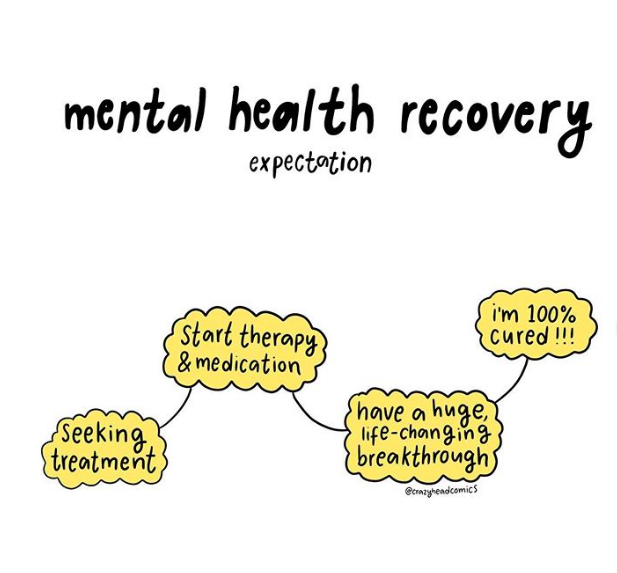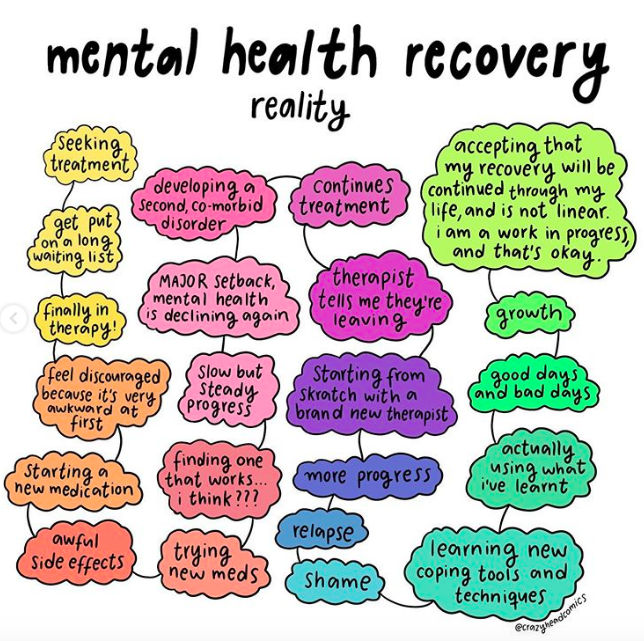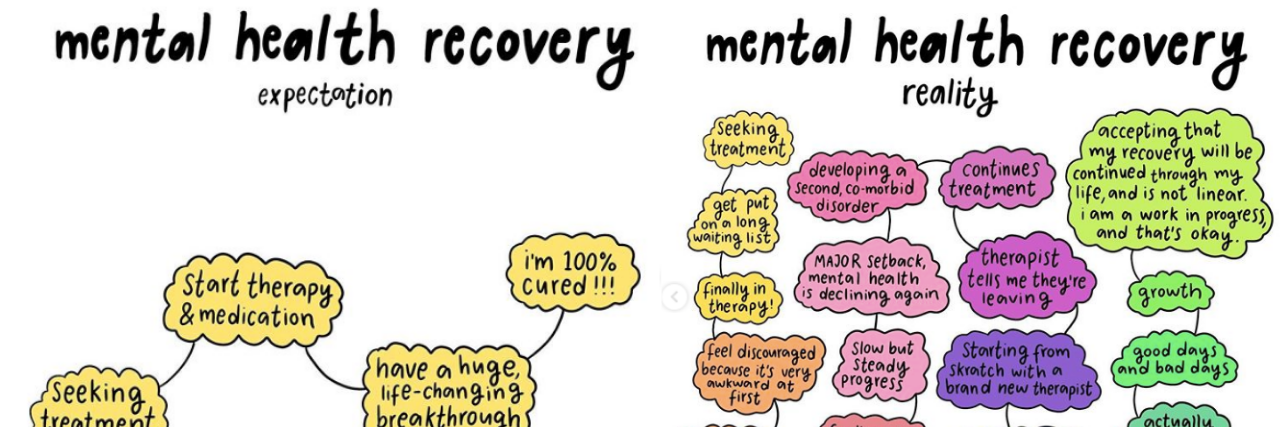How I Realized Recovering From a Mental Illness Wasn't Linear
When I went to my first therapy appointment at 15 years old, I arrived with a somewhat skewed perspective and unrealistic expectations of therapy. Perhaps I had seen too many movies where the protagonist went themselves; and after some sessions they had an emotional breakthrough of epic proportions — and suddenly all their pieces fell into place. They had been cured from their inner turmoil through a deep and profound realization. As I sat down in a chair to face my first therapist, I wondered for a moment what my big breakthrough would entail, and how long it would take me to be freed from my mental illness.
It didn’t take long until I realized those movies had it wrong. I kept waiting for that eureka moment, but nothing was going as expected. The process wasn’t linear. Every improvement was followed by a setback that left me exhausted. I got prescribed a promising medication, but was left with unmanageable side effects. I made progress with my panic disorder, only to develop post-traumatic stress disorder (PTSD) after experiencing trauma at 17. I clicked with my therapist, I adored her, but she had to go on pregnancy leave, which meant starting over with another therapist. I got put on antidepressants, which triggered a dysphoric manic episode that left me actively suicidal. Another medication, another therapist, another doctor, another treatment program, another support group, another relapse. A cycle of fickle hope and major disappointments. And the promise of being better, of wellness, seemed to seep out of the gaps between my fingers, like little specks of sand.
They say it gets better, but when? 
Image description: Text at the top reads, “Mental Health Recovery: Expectation.” A first thought bubble says, “Seeking treatment.” It’s connected to a second that says, “Start therapy & medication.” The next says, “Have a huge life-changing breakthrough.” The last one reads, “I’m 100% cured!”

Image description: Text at the top reads, “Mental Health Recovery: Reality.” Multiple, colorful thought bubbles are connected together that read, “Seeking treatment, “Get on a long waiting list,” “Finally in therapy,” “Feeling discouraged because it’s awkward at first,” “Starting a new medication,” “Awful side affects,” “Trying new meds,” Finding one that work… I think?” “Slow by steady progress,” “Major setback, mental health is declining again,” ” Developing a second c0-morbid disorder,” “Continues treatment,” “Therapist tells me they’re leaving,” “Starting from scratch with a new therapist,” “More progress,” “Relapse,” “Shame,” “Learning new coping tools and techniques,” “Actually using what I’ve learnt,” “Good days and bad days,” “Growth,” “Accepting that my recovery will be continued through my life, and is not linear. I am a work in progress, and that’s OK.”
Years later I am sitting with my latest therapist, a woman with a warm face, observant gaze and a strong but comforting Finnish-Swedish accent. I like her because she’s honest, but kind. When we first met, she asked me what my goals were from our time together, and I responded with a despondent, “I want to be better, I want to be cured. But I can’t get better, because my bipolar disorder is chronic. I can’t recover from this.”
She noticed my desperation, held space for those feelings, but then she explained so delicately to me that the word “cure” should not be my focus. I have always had a complex combination of mental health issues, and being completely free from all traces of mental illness might take all my life, or never happen at all.
I had been too wrapped up in having a perfect recovery, instead of learning to live my life despite my health issues. My goal should be to make my brain the healthiest it can, to make life as manageable as possible, to find ways to cope when it all crumbles around me. “Cured” is nice, but “Better” is my goal. Therapy is a series of little realizations and improvements, and a ton of heavy emotional work. It’s planting little seeds of wellness, small sparks of hope. Growth, good days and bad days.
So I made a visual representation of my journey, in hopes that it could help someone who feels that same desperation I did, who is longing for the relief of a cure. Perhaps it can help others see that recovery is not a straight road, an upwards curve. Therapy is trial and error, setbacks and improvements. I learned to be forgiving of myself, because the journey to recovery is to me, a constant work in progress.
See more of Matilda’s work on crazyheadcomics.
Image by crazyheadcomics


